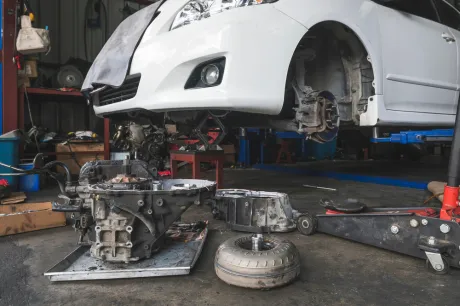Chevy Silverado & GMC Sierra Transmission Issues: When Your Work Truck Becomes a Liability

Key Takeaways
- Chevy Silverado and GMC Sierra owners, including those relying on their trucks for daily work, have reported widespread transmission problems, including shuddering, slipping gears, and jerking during acceleration or towing.
- ● Many of these issues trace back to GM’s 10L ten-speed transmissions, which have been linked to alleged defects that reportedly cause premature wear, harsh shifting, and other problems.
- Transmission replacements can cost between $5,000 and $7,000, a major financial setback for tradespeople, contractors, and business owners who depend on these trucks to make a living.
- Drivers experiencing transmission failure may be eligible to join class actions or pursue individual claims. Morgan & Morgan is helping owners recover repair costs and compensation for lost income and other harms and losses.
Injured?
For many Americans, a pickup truck isn’t just transportation. It’s a livelihood.
Whether you’re hauling materials to a job site, towing equipment, or driving between clients, your truck is a crucial part of your workday.
But for countless Chevy Silverado and GMC Sierra owners, serious transmission problems have turned their workhorses into ticking time bombs.
The issue goes far beyond inconvenience. When your truck can’t shift properly, loses power, or starts shaking on the highway, it’s life-threateningly dangerous, and when it’s your main source of income, every day in the shop is money lost.
The Extent of the Problem
The Chevy Silverado and GMC Sierra make up a significant portion of GM vehicle transmission complaints. According to automotive data compiled from recall filings and consumer reports, these two models account for nearly 60% of all complaints involving GM’s 10-speed automatic transmissions.
That’s not surprising when you consider how many of these trucks are on the road or, rather, off the road and stuck in the shop. Both the Silverado and Sierra share the same basic drivetrain architecture, meaning a defect in one often appears in the other.
What Drivers Are Experiencing
Owners across the country have taken to online forums, Reddit threads, and Facebook groups to vent about what they’ve been dealing with. On r/Trucks, one Silverado owner described their truck as “shaking so bad under light acceleration it feels like the transmission’s about to fall out.” Another Sierra driver said their transmission “slammed into gear at 20 mph like I got rear-ended.”
Common symptoms include:
- Shuddering or vibration between 25–65 mph
- Harsh or delayed shifting
- Slipping between gears
- Sudden lurching or jerking during acceleration
- Fluid leaks and overheating
In many reported cases, these issues start appearing at relatively low mileage, well before most drivers expect major drivetrain problems.
The Silverado 10-Speed Lawsuit
GM’s 10-speed automatic transmission, used in certain Silverado and Sierra models from 2019 to present, has been the subject of many consumer complaints. Multiple class action lawsuits assert that these transmissions suffer from a fundamental defect that causes erratic shifting, shuddering, and hesitation, even after software updates and fluid changes.
GM has issued several Technical Service Bulletins (TSBs) recommending a switch to Mobil 1 LV ATF HP transmission fluid, which can temporarily reduce the shudder, but for many owners, the fix doesn’t last.
Some drivers report that the problem comes back within months, leaving them with repair bills that can climb into the thousands.
The Cost of Keeping a Broken Work Truck Running
For tradespeople, contractors, and delivery drivers, the financial toll of these transmission issues can be devastating.
A full transmission replacement on a Silverado or Sierra can cost anywhere from $4,000 to $6,000, depending on the model year and labor rates. Even partial repairs, like replacing the torque converter or valve body, often exceed $2,000 to $3,000.
And that doesn’t account for lost income. Every day a truck is in the shop is a day of missed opportunities: missed jobs, missed deadlines, and in some cases, lost clients.
Why the Transmission Fails
The core issue often traces back to internal valve wear and fluid degradation, which can disrupt the hydraulic pressure that controls shifting. As a result, the torque converter clutch slips, causing that dreaded shudder many owners describe.
In some 10-speed models, a separate issue in the transmission control module software can cause gear hesitation or even sudden downshifts. These problems are compounded by GM’s shared platform design, meaning the same weak points appear across multiple trucks and SUVs.
What You Can Do if You Own a Silverado or Sierra
If your truck is showing signs of transmission failure, you’re not alone, and you may have legal options. Here’s what to do:
- Check for Recalls and Technical Bulletins. You can look up your VIN on GM’s website or through the National Highway Traffic Safety Administration (NHTSA).
- Keep All Service Records. If you’ve already had your transmission repaired or flushed, keep copies of every invoice. These documents could help prove a pattern of recurring issues.
- Contact Morgan & Morgan. If the dealership can’t fix your transmission or if you’ve paid out of pocket for repeated failures, you may be eligible for compensation through a class action or an individual claim.
How Morgan & Morgan Can Help
At Morgan & Morgan, we’re already investigating claims involving defective transmissions in Chevy Silverado and GMC Sierra trucks. We understand how critical these vehicles are to your livelihood, and we believe you shouldn’t have to shoulder the cost of GM’s design failures.
Our attorneys are here to fight for owners and workers who’ve been left stranded by defective vehicles. We’ll review your case for free, explain your legal options, and help you pursue compensation for repairs, lost wages, and other damages.
If your Silverado or Sierra has suffered from transmission shudder, jerking, or failure, don’t take any risks on the road. Instead, take action.

We've got your back
Injured?
Not sure what to do next?
We'll guide you through everything you need to know.

